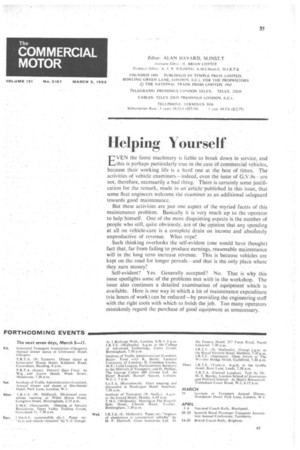Helping Yourself
Page 35

If you've noticed an error in this article please click here to report it so we can fix it.
EVEN the finest machinery is liable to break down in service, and this is perhaps particularly true in the case Of Commercial vehicles, because their working life is a hard one at the best of fifties. The activities of vehicle examiners—indeed; even the issue of G.V.9s—are not, therefore, necessarily a bad thing. There is certainly some justification for the remark, made in an article publishedin this issue, that some fleet engineers welcome the examiner as an additiOnal safeguard towards good maintenance.
But these activities are just one aspect of the myriad facets of this maintenance problem. Basically it is very much up to the operator to help himself. One of the more disquieting aspects is the number of people who still, quite obviously, are of the. opinion. that any spending at all on vehicle-care is a complete drain on income and absolutely unproductive of revenue. What tripe!
Such thinking overlooks the self-evident (one would, have thought) fact that, far from failing to produce earnings, reasonable maintenance will in the long term increase revenge. This is because vehicles, are kept on the road for longer periods—and that is the only place where they earn money! Self-evident? Yes. Generally accepted'? No. That is why this issue spotlights some of the problems met with' in the workshop. The issue also continues a detailed examination of equipment which is available. Here is one way in which a lot of maintenance expenditure (via hours of work) can be reduced—by providing the engineering staff with the right tools with which to finish the job. Too many operators mistakenly regard the purchase of good equipment as unnecessary.




























































































































































